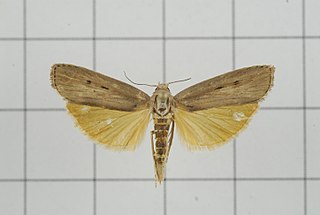
The Pyraloidea are a moth superfamily containing about 16,000 described species worldwide, and probably at least as many more remain to be described. They are generally fairly small moths.

Achille Guenée was a French lawyer and entomologist.

The Pyralinae are the typical subfamily of snout moths and occur essentially worldwide, in some cases aided by involuntary introduction by humans. They are rather rare in the Americas however, and their diversity in the Australian region is also limited. Altogether, this subfamily includes about 900 described species, but new ones continue to be discovered. Like many of their relatives in the superfamily Pyraloidea, the caterpillar larvae of many Pyralinae – and in some cases even the adults – have evolved the ability to use unusual foods for nutrition; a few of these can become harmful to humans as pests of stored goods.

Evergestis is a genus of moths of the family Crambidae described by Jacob Hübner in 1825. A number of species are pests, including the cross-striped cabbageworm, a pest of cole crops such as cabbage.

Trichophysetis is a genus of moths of the family Crambidae.

The Chrysauginae are a subfamily of snout moths. They are primarily Neotropical and include about 400 described species.

The Phycitini are a tribe of moths of the family Pyralidae.

The Anerastiini are a tribe of moths of the family Pyralidae.

Isauria dilucidella is a species of moth in the family Pyralidae. It was described by Philogène Auguste Joseph Duponchel in 1836. It is found in most of Europe, Algeria, the United Arab Emirates, Syria, Lebanon, the Palestinian territories, Iraq, Turkmenistan, Mongolia, as well as Georgia, Kazakhstan, Armenia, Turkey, Iran and Afghanistan.

Selagia spadicella is a species of snout moth. It is found in most of Europe, as well as in Turkey and North Africa.
Platytes cerussella is a species of moth in the family Crambidae. It is found in almost all of Europe.
Pachypodistes angulata is a species of snout moth in the genus Pachypodistes. It is found in Peru.
Pachypodistes goeldii is a species of snout moth in the genus Pachypodistes. It was described by George Hampson in 1905 and is known from Brazil.
Pachypodistes sthenistis is a species of snout moth in the genus Pachypodistes. It is found in Venezuela.

Tirathaba mundella, the oil palm bunch moth, is a species of snout moth. It is found in Malaysia.
Glaphyriinae is a subfamily of the lepidopteran family Crambidae. It was described by William Trowbridge Merrifield Forbes in 1923

Scopariinae is a subfamily of the lepidopteran family Crambidae. The subfamily was described by Achille Guenée in 1854.










